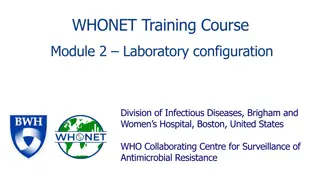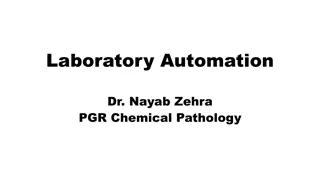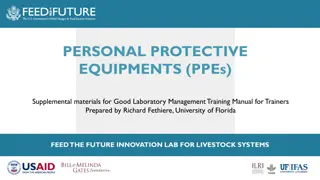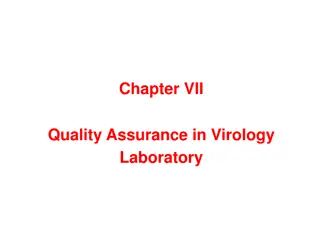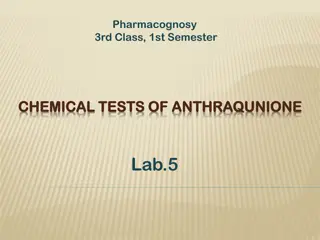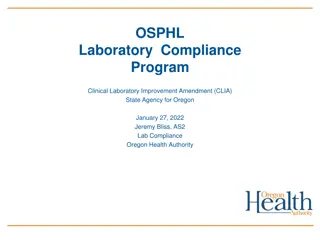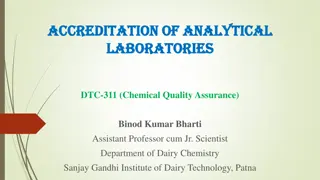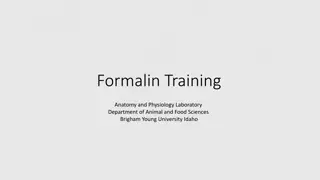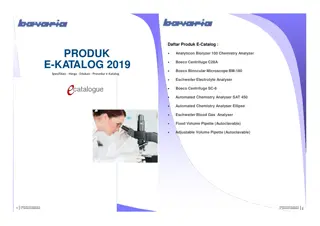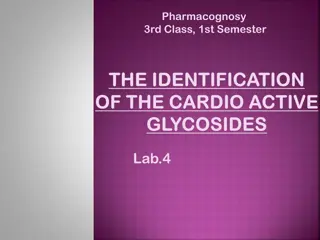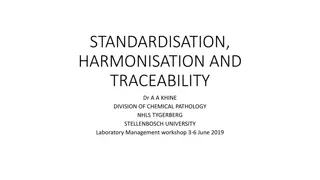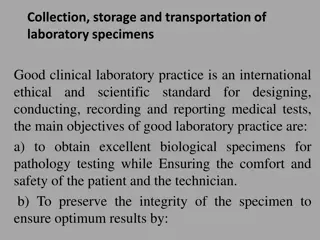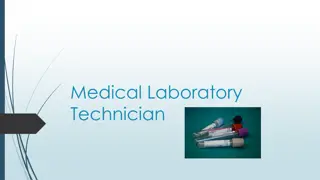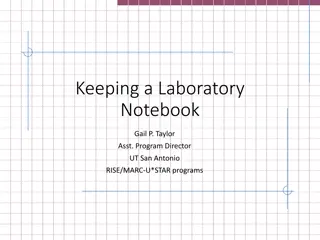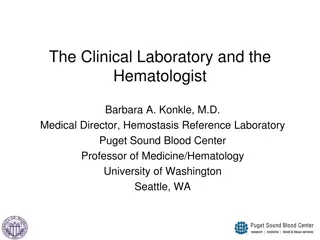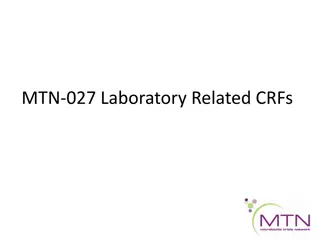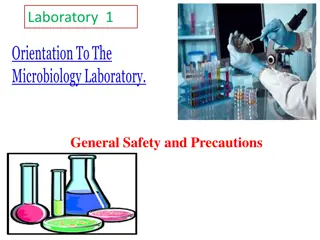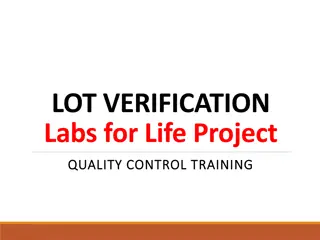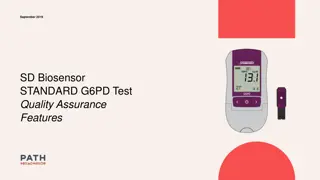History and Educational Programs of DEU Lab Animal Science Department
Established in 2004, the Department of Laboratory Animal Science at Dokuz Eylul University Institute of Health Sciences offers cutting-edge education focusing on animal welfare and ethical practices in scientific research. The department upholds the 3R Principle—Reduction, Refinement, Replacement�
0 views • 9 slides
Research Antibodies and Reagents Market to be Worth $6.77 Billion by 2031
Research Antibodies and Reagents Market by Product (Antibodies {Type [Primary, Secondary]} {Production [mAb, pAb]} {Source [Mouse, Rabbit]} Research Area} Media, Stains, Enzyme) Technology (ELISA, Flow Cytometry), Application\u2014Global Forecast to 2031
2 views • 4 slides
Laboratory Material Quality Management Procedures
This detailed guide covers the comprehensive process management and quality control procedures for laboratory materials, including the life cycle of materials, purchase processes, vendor evaluation, reception and storage guidelines, and evaluation criteria. It emphasizes the importance of documented
0 views • 20 slides
Comprehensive Overview of ABE Lab Manual and Foundations of Biotech Package
The ABE Lab Manual, authored by Doreen Osgood, MS, PhD, is a comprehensive resource for biotechnology education, including sequences like Genetic Engineering and Colony PCR. The manual includes teacher and student guides, along with related resources like PowerPoint presentations and lists of labora
1 views • 5 slides
Effective Laboratory Management: Safety, Equipment Maintenance, and Inventory Control
This comprehensive training manual covers essential topics such as laboratory safety, equipment maintenance, supplies and reagents inventory, chemical inventory management, and material safety data sheets. It emphasizes the importance of proper procedures to ensure a safe working environment and eff
1 views • 19 slides
Research Antibodies and Reagents Market - Global Opportunity Analysis and Industry Forecast (2024-2031)
Meticulous Research\u00ae\u2014a leading global market research company, published a research \nreport titled, \u2018Research Antibodies and Reagents Market by Product (Antibodies {Type \n[Primary, Secondary]} {Production [mAb, pAb]} {Source [Mouse, Rabbit]} Research Area} \nMedia, Stains, Enzyme) T
3 views • 4 slides
Research Antibodies and Reagents Market - Global Opportunity Analysis and Industry Forecast (2024-2031)
Meticulous Research\u00ae\u2014a leading global market research company, published a research report titled, \u2018Research Antibodies and Reagents Market\u2019 by Product (Antibodies {Type [Primary, Secondary]} {Production [mAb, pAb]} {Source [Mouse, Rabbit]} Research Area} Media, Stains, Enzyme) T
5 views • 4 slides
Biochemical Reagents Market
Meticulous Research\u00ae\u2014a leading global market research company, published a research report titled, \u2018Biochemical Reagents Market by Type (PCR, Chromatography, Cell & Tissue Culture, Flow Cytometry, Electrophoresis, Immunoassay) End User (Pharmaceutical & Biotechnology, CRO, Diagnostic
1 views • 4 slides
Optimizing Laboratory Billing Services, The Key to Efficient Healthcare Revenue Management
In the intricate web of healthcare management, laboratory billing services play a pivotal role. From accurately documenting procedures to ensuring compliance with complex insurance regulations, effective billing is essential for the financial health of laboratories and the overall healthcare system.
2 views • 8 slides
WHONET Training Course: Laboratory Configuration and Setup
Understanding the laboratory configuration process in WHONET is crucial for effective data entry and analysis. This module guides users on setting up a new laboratory, entering country and lab details, defining antibiotics, sample locations, and data fields, creating microbiological alerts, and savi
3 views • 57 slides
Streamlining Laboratory Billing Services, Key Benefits and Best Practices
In the fast-paced environment of medical laboratories, accurate and efficient billing processes are essential. Laboratory billing services are crucial in ensuring financial stability and compliance with healthcare regulations. This blog explores the benefits of professional laboratory billing servic
1 views • 7 slides
Enhancing Laboratory Billing Services with MedKarma, A Comprehensive Guide
In the dynamic healthcare landscape, laboratory billing services play a crucial role in ensuring smooth financial operations for medical laboratories. Effective billing practices not only streamline revenue cycles but also enhance overall operational efficiency. MedKarma, a leading provider of labor
1 views • 7 slides
Revolutionizing Laboratory Billing Services with Medkarma, Precision, Efficiency, and Transparency
In the ever-evolving healthcare landscape, laboratory billing services stand as a critical component in ensuring the financial health of diagnostic labs. The complexity of billing processes, coupled with stringent compliance requirements, demands a specialized approach. Medkarma, a leader in healthc
1 views • 7 slides
Principles of Green Chemistry: Catalysis and Bio-Catalysis
The 9th Principle of Green Chemistry emphasizes the use of catalysis to improve reaction efficiency and reduce waste generation. Catalytic reagents enhance selectivity, reduce energy consumption, and minimize the need for stoichiometric reagents. Green catalysis, especially bio-catalysis using enzym
0 views • 25 slides
Laboratory Automation in Chemical Pathology: A Comprehensive Overview
Laboratory automation in chemical pathology involves the use of control systems to minimize human intervention and improve efficiency in conducting tests. The historical background, types of automation, benefits, total laboratory automation, and important considerations are discussed in detail.
1 views • 25 slides
Best Practices for Laboratory Safety and Management
Promoting a safe laboratory environment involves following safety codes and assigning responsibilities for practices like hazard awareness, equipment use, and PPE. Good laboratory practices include proper storage and handling of hazardous chemicals, with a focus on flammable, corrosive, reactive, an
3 views • 17 slides
Quality Assurance in Virology Laboratory
This chapter focuses on quality assurance in virology laboratory, covering topics such as quality control, documentation of test results, laboratory safety rules, and more. It explains the types of quality control, quality assurance cycle, and process areas of quality assurance in laboratory testing
2 views • 19 slides
Chemical Tests of Anthraquinone in Aloe Vera Extract
This laboratory experiment focuses on conducting chemical tests to identify anthraquinone glycosides in Aloe vera extract. The tests include Schoneten's reaction (Borax test) and Bromine test for aloin, providing specific reactions for the presence of these compounds. Additionally, special reagents
1 views • 12 slides
Understanding CLIA: Ensuring Quality Laboratory Testing in Oregon
Describing the Clinical Laboratory Improvement Amendments (CLIA) program in Oregon, focusing on sustainable compliance for quality laboratory testing. Explains the purpose of CLIA, types of certifications, and requirements for laboratories. Highlights the role of the Oregon State Agency in administe
0 views • 13 slides
Understanding Laboratory Accreditation of Analytical Laboratories
Laboratory accreditation ensures third-party certification of testing and calibration competence, providing formal recognition to laboratories. This accreditation allows customers to identify reliable services and ensures laboratories maintain technical competence. Accreditation bodies use specific
1 views • 20 slides
Formalin Safety Guidelines in Anatomy and Physiology Laboratory
Formalin, a mixture of formaldehyde and water, is used in laboratories to preserve tissues. OSHA regulates exposure levels due to health risks. Proper ventilation and personal protective equipment are crucial to control exposure. The laboratory employs engineering controls and monitoring for safety.
0 views • 16 slides
Laboratory Equipment E-Catalog 2019
Explore the E-Catalog featuring various laboratory equipment such as the Analyticon Biolyzer 100 Chemistry Analyzer, Boeco Centrifuge C28A, and Eschweiler Blood Gas Analyzer. View specifications, prices, education materials, and procedures for these advanced laboratory tools. The catalog includes es
2 views • 7 slides
Identification of Cardioactive Glycosides Through Chemical Tests
The laboratory experiments focus on identifying cardioactive glycosides through chemical tests like Baljets Test and Keller-Killians Test. These tests involve reactions with specific reagents to observe color changes and layer formations, helping in the identification of different parts of the glyco
2 views • 11 slides
Understanding Ion-Pair Chromatography (IPC): Theory and Applications
Ion-Pair Chromatography (IPC) involves adding ionic surfactants to a reversed-phase Chromatography system to affect retention and selectivity of ionic compounds. Developed by Dr. Gordon Schill, IPC is crucial for resolving hydrophilic samples and controlling selectivity in separations. The theory in
6 views • 18 slides
Understanding Anticoagulants in Laboratory Hematology
Anticoagulants are crucial additives that prevent blood clotting during laboratory procedures. The commonly used anticoagulants include EDTA, sodium citrate, and heparin, each with specific concentrations, modes of action, and color-coded identifications. EDTA is ideal for blood cell counts, sodium
0 views • 6 slides
Achieving Comparable Results in Laboratory Practice
Good laboratory practice necessitates minimal error in measurement to reflect a patient's biological condition accurately, ensuring comparable and reliable results regardless of testing location or method. Standardization, harmonization, and traceability play crucial roles in achieving uniformity an
0 views • 29 slides
Best Practices for Clinical Laboratory Specimen Handling
Good clinical laboratory practice emphasizes the proper collection, storage, and transportation of laboratory specimens to ensure accurate and reliable test results. Key aspects include obtaining high-quality specimens, maintaining specimen integrity, and following standard precautions to prevent co
6 views • 6 slides
Comprehensive Resources for Medical Laboratory Technicians
Extensive resources are available for medical laboratory technicians, including tutorials for evaluating health information, access to credible research libraries, and free professional publications. Specific resources cover phlebotomy techniques, hematology tutorials, blood banking procedures, and
1 views • 7 slides
Agglutination Testing in Laboratory Medicine
Agglutination testing is a common method used in laboratory medicine to detect the presence and amount of antigens or antibodies in patient samples. It involves the use of carrier particles such as latex, RBCs, charcoal, and protein A of Staph aureus. The testing process includes qualitative and qua
0 views • 18 slides
Essential Guidelines for Keeping a Laboratory Notebook
Understanding the importance of maintaining a laboratory notebook is crucial in research settings. The notebook serves as a comprehensive record of procedures, reagents, data, and thoughts to be shared with fellow researchers. It also functions as a place to troubleshoot issues, compile data, and de
2 views • 23 slides
Insights into Hematology Laboratory Practice
This resource explores the potential role of hematologists in laboratory settings, discussing board certification, advantages, challenges, current training trends, and core curriculum lectures in hematology. It sheds light on the critical areas of laboratory training, emphasizing the importance of u
0 views • 9 slides
Laboratory Related CRFs for Pharmacokinetics Study
This collection encompasses various CRFs related to laboratory procedures in the context of Pharmacokinetics for a study. It includes forms for enrollment, specimen storage, safety laboratory results, and specific days for sample collection. The CRFs detail the storage, collection, and documentation
0 views • 14 slides
Laboratory General Safety and Precautions
Microbiology involves the study of microorganisms such as bacteria, fungi, viruses, and parasites. It is crucial to maintain strict safety protocols in the laboratory to prevent contamination and ensure the well-being of individuals handling these potentially pathogenic organisms. Rules like wearing
0 views • 26 slides
Comprehensive Overview of Esterification Reactions
Esterification is a versatile chemical process to synthesize esters, involving various methods like Fischer esterification, Schotten-Baumann reaction, and Steglich esterification. Different reagents and catalysts are utilized for efficient ester formation, with considerations like reaction equilibri
0 views • 10 slides
Quality Control Training for Labs: Ensuring Reagent and Consumable Quality
This project focuses on maintaining quality control in laboratories by verifying reagents and consumables, adhering to ISO and NABL standards. It includes checking and verifying each lot of control and reagent, assessing transportation factors, monitoring temperature control, and performing lot-to-l
0 views • 13 slides
Standard G6PD Test Quality Assurance Guide
This comprehensive guide covers the quality assurance features of the SD Biosensor STANDARD G6PD Test, including instructions on checking the strip, code chip, and control reagents. Learn how to use the check strip, change the code chip, and utilize quality control reagents for accurate testing resu
0 views • 14 slides
Understanding Laboratory Animal Genetics and Research Importance
This course (AGB 610) delves into the realm of laboratory animal breeding, exploring the significance of using animals in research and teaching. Dr Shanker Dayal, a distinguished professor, guides students through lectures on animal genetics and the common uses of laboratory animals. The course emph
0 views • 14 slides
Exploring the Role and Objectives of Laboratory Teaching
The content delves into the various perspectives on laboratory teaching, its aims, pedagogical levels, and common challenges faced. It discusses specific aims of laboratory teaching, including familiarization with equipment, teaching experimental work attitudes, and training in observation and deduc
0 views • 32 slides
Laboratory Examination of Double Replacement Reaction
A detailed exploration of double replacement reactions in the laboratory setting, highlighting safety precautions, chemical theory, examples, reaction equations, materials required, reagents used, step-by-step procedures, and data analysis. The content provides valuable insights into the practical a
0 views • 23 slides
Guidelines for Nomenclature of Laboratory Mouse and Rat Strains
Laboratory mice and rat strains have specific nomenclature guidelines to account for their genetic backgrounds and origins. Mouse strains are registered through the Mouse Genome Database, while rat strains are registered through the Rat Genome Database. The use of Laboratory Registration Codes is cr
0 views • 14 slides









